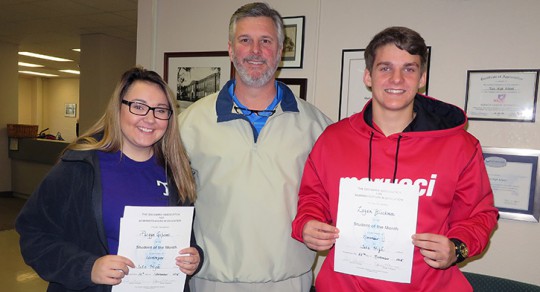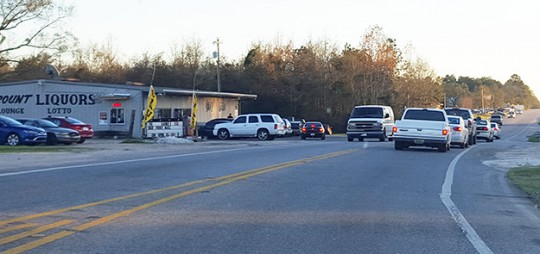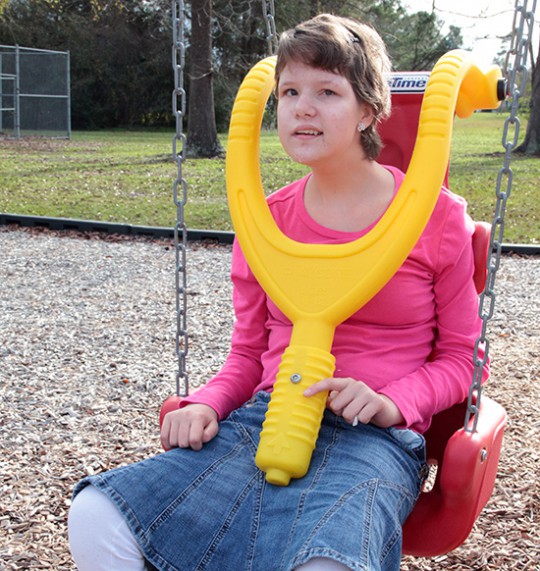Tate High Names Students Of The Month
January 8, 2016
Tate High School has named Students of the Month for November. They are Paigge Gibson and Logan Blackmon, pictured with Principal Rick Shackle. Photo for NorthEscambia.com, click to enlarge.
Senate Panel Could Hold Key To Gun Bills
January 8, 2016
Florida lawmakers will enter the annual legislative session Tuesday with a full clip of firearm-related bills.
And it appears a Senate committee could play a pivotal role in determining whether two of the more controversial proposals advance this year.
One of the proposals (HB 4001 and SB 68) would allow people with concealed-weapons licenses to carry firearms on state college and university campuses, while the other (HB 163 and SB 300) would allow people with the licenses to openly carry guns. Both issues await decisions in the Senate Judiciary Committee, where the campus-carry measure died last year.
Senate President Andy Gardiner, R-Orlando, said last month that he told Senate Judiciary Chairman Miguel Diaz de la Portilla, R-Miami, not to drag out the decision.
Diaz de la Portilla, who did not respond to requests for comment, has not said if he will bring up the bills during the 60-day session.
House Minority Leader Mark Pafford, D-West Palm Beach, said he hopes the measures will be “killed or slowed down” in the Senate.
“It’s irresponsible gun legislation,” Pafford said. “Hopefully, the Senate will come to its senses. It’s reckless behavior.”
Second Amendment advocates say if the campus-carry and open-carry issues are muzzled this year, they will continue to pursue the measures in future years.
“It would mean the bills will be back next year,” influential National Rifle Association lobbyist Marion Hammer said in an email.
Sean Caranna, executive director of Florida Carry, Inc., said passing the bills is “inevitable.”
“Florida’s law-abiding gun owners will not stop advocating strongly for the right to bear arms. … Ever,” Caranna said in an email. “Elected officials who oppose constitutional rights will have a reckoning to contend with from their constituents at election time. The right to bear arms is a primary issue to most gun owners, and gun owners vote at a much higher rate than other segments of the population.”
Florida started the year with 1.48 million people holding concealed-weapons permits.
Other firearm measures before the Legislature include:
— A proposal (HB 169 and SB 344) that would shift the burden of proof to prosecutors when people invoke the state’s “stand your ground” self-defense law in cases involving incidents such as shootings.
The proposal, opposed by prosecutors, appeared to die in the House Criminal Justice Subcommittee in November when it failed to receive a favorable vote. However, the Senate version has moved through committees to the Senate floor, where, if approved, it could be attached to legislation that would go to the House.
— A proposal (HB 41 and SB 130), already teed up for votes in the House and Senate, that would seek to prevent people from shooting guns at backyard gun ranges in residential areas.
— A proposal (HB 4031) that would allow people with concealed-weapons licenses to bring their sidearms into meetings of the Legislature, city councils and school boards. The bill has not been heard in House committees, and a Senate version has not been filed.
Any pro-gun bills reaching Gov. Rick Scott’s desk would allow the governor to set a modern record for signing firearm-related measures into law.
Since he took office in 2011, Scott has signed 14 pro-gun laws. The ranged from the 2011 “docs v. glocks” law, which restricts doctors from asking patients about gun ownership, to a measure last year that allows people to bring their weapons with them when forced to leave home because of hurricanes or other disasters.
By comparison, Scott’s predecessor, former Gov. Charlie Crist, signed three pro-gun measures into law during a four-year span. Former Gov. Jeb Bush affixed his name to 14 pro-gun bills — including the “stand your ground” law — during his eight-year tenure as chief executive.
by Jim Turner, The News Service of Florida
Houses Pushes Scaled-Back Pension Reform
January 8, 2016
House leaders are gearing up to take another run at overhauling the pension system for state and county employees in the coming legislative session, potentially by tying the controversial changes to limited tweaks sought by the Senate.
The approach mirrors a previous effort by the House to combine changes to the Florida Retirement System, or FRS, with local pension reform supported by a bipartisan group of lawmakers. When House Speaker Steve Crisafulli dropped demands that the local changes be paired with a revamp of state retirement benefits, the local bill was approved during last year’s session.
But Crisafulli, R-Merritt Island, recently told reporters that House Republicans are interested in trying to tackle the retirement system again in 2016. The major thrust of the legislation would be changing the default choice for new state employees who don’t select a plan. The default would go from the traditional “defined benefit” pension system to 401(k)-style accounts.
That could dramatically increase the number of workers in the 401(k)-style “defined contribution” plan. The House has in recent years backed away from legislation that would require new state employees to enter the defined contribution plan, eventually leading to the defined benefit plan being closed down — something fiercely opposed by labor groups and a bipartisan collection of senators.
“Obviously, the House has a position, we’ve had a position on this,” Crisafulli said. “But for us, it’s about finding where we can work with the Senate to find a common ground. And the default is a good place for us to start.”
Supporters have eased away from pitching the plan as a way to help shore up the FRS, which is not fully funded. Opponents have countered that the retirement system is still financially sturdy and is in far better shape than beleaguered pension systems across the country.
Now, those pushing for a change are focusing on the need to allow state employees more flexibility. They point out that many workers change jobs before vesting in the pension plan — essentially losing the money that they’ve paid into the system for years.
“It’s about making sure that the majority of state employees walk away with something when they leave,” said House State Affairs Chairman Matt Caldwell, a North Fort Myers Republican who is working on the proposal.
Caldwell said he expected the bill to be released sometime in the next couple of weeks, after the House finishes up work on some environmental issues that his committee also handles. The annual legislative session starts Tuesday.
Crisafulli said he hoped the new plan would prompt a change in the Senate, which has long resisted House attempts to dramatically overhaul the program.
“I think there is some potential movement,” he said. “I think in the past we’ve taken big bites at the apple. I think this is an opportunity to maybe find some things that we can find common ground on.”
Even with a reduced scope, though, there could be challenges for the legislation in the Senate. A similar effort to change the default option for the FRS died in the Senate in 2014, when opponents used a procedural move to scuttle the proposal.
“I don’t think there’s a lot of appetite in the Senate to do FRS reform,” said Sen. Jeremy Ring, a Margate Democrat who chairs the committee dealing with pensions and has worked with Republicans on the issue.
The Senate has instead focused on a couple of smaller changes to the FRS. One bill (SB 7012) would double the survivor benefits offered to the families of certain state employees, like firefighters and law enforcement officers, who are killed in the line of the duty. Another proposal (SB 7014) would fix unintended consequences of legislation passed several years ago to cut down on “double dipping” by members of the FRS.
Ring said he was uncomfortable with discussions about tying either of those ideas with the House’s more sweeping goals on the pension plan.
“If they want to change the default, then there should be a bill to change the default,” he said.
Caldwell countered that the two issues are in the “same wheelhouse,” and there’s nothing wrong with blending both chambers’ priorities on the pension plan.
“I think it is prudent for us to negotiate those issues in concert,” he said.
by Brandon Larrabee, The News Service of Florida
Three New K-9 Deputies At Work For The Escambia Sheriff’s Office
January 8, 2016
The new K-9 deputies went to work for the Escambia County Sheriff’s Office on December 26. In less than two weeks, Alek, Django, and Cairo and their handlers have tracked down suspects and taken illegal narcotics off the streets. Courtesy photo by the Escambia County Sheriff’s Office for NorthEscambia.com, click to enlarge.
No Powerball Winners; Saturday’s Jackpot Now $800 Million
January 7, 2016
No one held a ticket with all the winning numbers in Wednesday’s estimated $524 million Powerball jackpot — 47, 2, 63, 62, 11 and the Powerball of 17.
 That means the jackpot rolls over to what will the largest lottery jackpot in U.S. history estimated at $800 million (or $496 million lump sum) for this Saturday. And that number could grow even higher.
That means the jackpot rolls over to what will the largest lottery jackpot in U.S. history estimated at $800 million (or $496 million lump sum) for this Saturday. And that number could grow even higher.
The prize payout started at $450 million and surged to $524 million Wednesday night, the fourth largest Powerball jackpot of all time.
Late Wednesday afternoon, Powerball players swarmed two lottery retailers along Highway 97 at the state line in Davisville, creating a traffic backup at times. But overall, players found lines that moved relatively quickly.
Powerball is played by 44 states and the District of Columbia, the U.S. Virgin Islands and Puerto Rico.
NorthEscambia.com photos, click to enlarge.
State Board Of Education Votes On Test Scores, School Grades
January 7, 2016
The Florida Board of Education voted overwhelmingly Wednesday to back Commissioner Pam Stewart on proposals about test scores and school grades, turning aside concerns from business and education-reform groups.
But even as the board went ahead with Stewart’s ideas on a pair of 6-1 votes, some lawmakers were floating ideas for making changes that could complicate the process of calculating school grades in the future.
 Board members considered where to set two critical benchmarks of the state’s education accountability system: “cut scores” that determine the levels of achievement students get based on their performances on standardized tests and the school grades tied to how well students do on those tests.
Board members considered where to set two critical benchmarks of the state’s education accountability system: “cut scores” that determine the levels of achievement students get based on their performances on standardized tests and the school grades tied to how well students do on those tests.
The changes are necessary because of the state’s move to the Florida Standards Assessments, a set of tests given to public school students. Stewart’s proposals opened up a rare battle between board members, who were appointed by a Republican governor, and a coalition of business and education-reform groups that generally back the GOP’s education policies.
Those groups have pushed for the state to line up what is essentially considered a passing score on the state test to the National Assessment of Educational Progress, a highly regarded, nationwide standardized test. That would have increased the number of students who would fall short of passing the Florida exams.
“Too often, Florida’s employers have difficulty finding and hiring qualified talent. … We need to ensure our students are not only successfully graduating from high school, but they are doing so based upon honest indicators they have actually achieved proficiency in math and English language arts,” wrote Mark Wilson, president and chief executive officer of the Florida Chamber of Commerce, in comments submitted to the board.
Critics were also disappointed in Stewart’s recommendations for school grades under the new system, arguing that more students need to be required to pass the tests for schools to receive certain grades.
The system the board adopted would see 189 schools receive “F” grades for the 2014-15 school year, according to a simulation run by the department. But under one of three options proposed by the Foundation for Excellence in Education, an advocacy group founded by former Gov. Jeb Bush, the number of “F” schools would have been 503.
School superintendents, who have asked for the school grading system to be paused altogether, said they supported Stewart’s proposal over the others. Leon County Superintendent Jackie Pons said proceeding with school grades carefully was particularly important because schools that have historically struggled wouldn’t be able to rely on how much progress students made on the new tests in the first year.
The measurement for “learning gains” will not take place until the grades for the 2015-16 school year.
Pons and others said the stigma of receiving failing grades is a blow to morale at schools.
“When we give these schools an ‘F’ grade, what we do to those schools for a long time is devastating,” Pons said.
Some board members who supported Stewart’s proposal said they would be open to revisiting the school-grade standards later this year, when the department gets ready to issue the next round of report cards. But board member John Padget, the only member to vote against Stewart’s proposals, was skeptical about the chances to increase standards and cause more schools to fail.
“Are we prepared when we raise the bar (that) there might be more than 189?” he said. “That will be the pressure we’ll be under.”
As board members debated the proposals in the Cabinet room at the state Capitol, two top aides to Gov. Rick Scott sat in the audience. After the meeting, Stewart didn’t directly answer a question about how much input Scott’s office had in crafting the standards or how board members, appointed by the governor, voted.
“We work closely with the governor’s office on many policy issues, so this would have been like any other policy issues,” she said. “Again, as I mentioned before, I have the luxury of being able to make the recommendation that I believe to be the best one, and that’s what I did here.”
Meanwhile, some state lawmakers are already looking to introduce another element into the testing debate. Sen. Don Gaetz, a Niceville Republican who chairs the Senate’s education-funding committee, has introduced legislation that would allow districts to use national standardized tests like the SAT and ACT instead of the state’s exams.
Gaetz said Wednesday the legislation (SB 1360) has bipartisan support. However, it doesn’t currently have a House counterpart.
While shying away from directly addressing whether the bill was a good idea, Stewart indicated to reporters that it could complicate the state’s accountability efforts.
“I think if there were an alternate that were provided, it puts us in a bad spot from the standpoint of, we’re no longer aligned to what’s being taught,” she said. “Our assessment has to be aligned to what’s being taught.”
Gaetz said the current test also wasn’t completely lined up to the state’s education standards and that tests like the SAT and ACT can measure whether students are ready to move on.
“If it’s good enough to get you into a college, it ought to be good enough graduate you from a Florida high school,” he said.
by Brandon Larrabee, The News Service of Florida
Cantonment Man Leads Deputies On Foot Chase; Charged With Robbery, Assault, Drugs
January 7, 2016
A Cantonment man as been charged in connection with an alleged robbery of a person off Nine Mile Road.
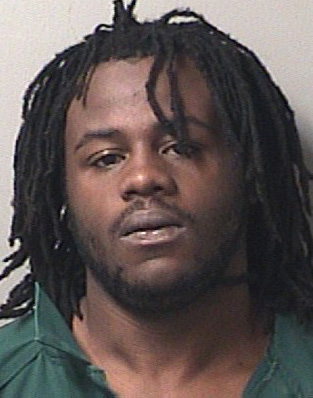 Anthony Antonio Purifoy, age 21 of Robinson Street, was charged with robbery with a firearm, and aggravated assault with a deadly weapon.
Anthony Antonio Purifoy, age 21 of Robinson Street, was charged with robbery with a firearm, and aggravated assault with a deadly weapon.
Purifoy allegedly went to an address on Jasma Lane off West Nine Mile Road last October and called the victim and told him to step outside his residence. The victim said that when he went outside he encountered a subject later identified as Purifoy who pulled out a handgun in attempt to rob the victim. The victim reported that he tussled with Puriifoy and was able to run away, hearing a gunshot as he ran.
The Escambia County Sheriff’s Office later received a call from a relative of Purifoy stating that he was responsible for the incident on Jasma Lane, and that the victim had threatened to “shoot up the area” in Cantonment and kill Purifoy, according to an arrest report. A warrant was issued for his arrest.
Purifoy was taken into custody this week after a foot chase with deputies in the are of Robinson Street and Taylor Road in Cantonment. At the time of his arrest, he allegedly had both powder and crack cocaine, and marijuana in his possession, and he first provided deputies with a false name.
For the Cantonment incident, Purify was also charged with possession of cocaine, resisting without violence, providing a false name to a law enforcement officer and possession of marijuana. He was also charged with violating probation in an outstanding grand theft auto case and failure to appear in a misdemeanor driver’s license case.
Purifoy remained in the Escambia County Jail with bond set at $515,000.
Lawmakers Weigh Incentives, Tax Cuts
January 7, 2016
Gov. Rick Scott wants $250 million to attract companies to Florida and hopes to convince lawmakers to support a series of business-friendly tax cuts that would permanently remove more than $1 billion from state revenue.
With the 60-day legislative session ready to start next week, the tax cuts may be reached — but not exactly how Scott would like.
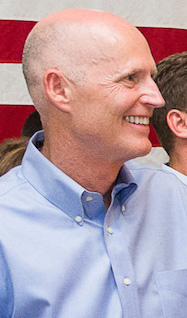 Meanwhile, Scott continues to line up support from local leaders, economic-development groups and lawmakers — mostly House Republicans — to bolster his case that money for economic incentives should be dramatically increased. But not everyone in the Republican-dominated Legislature agrees, which is why Scott is also dangling several ways to reform the incentives process.
Meanwhile, Scott continues to line up support from local leaders, economic-development groups and lawmakers — mostly House Republicans — to bolster his case that money for economic incentives should be dramatically increased. But not everyone in the Republican-dominated Legislature agrees, which is why Scott is also dangling several ways to reform the incentives process.
Among the critics of the incentives request is the conservative-advocacy group Americans for Prosperity-Florida, which calls it “corporate welfare handouts.” Democrats contend the state should consider other uses for the money, such as increasing funding for education and health care.
Senate leaders also clashed last year with Scott about economic incentives. Senate President Andy Gardiner, R-Orlando, said Scott has “done a good job of starting the debate” about revamping the incentives process, but the dollar request needs more review.
Incentives and tax cuts will be two heavily scrutinized issues during the legislative session that starts Jan. 12 and is scheduled to end March 11. Lawmakers enter the session with a budget surplus, but incentives and tax cuts will be part of the debate about how to carve up state money.
House Speaker Steve Crisafulli, R-Merritt Island, said lawmakers might be able to meet the $1 billion tax-cut request, but the governor shouldn’t expect it to be fully in line with his proposal.
Also, while Scott’s office contends Florida can afford the tax cuts, state economists haven’t been as optimistic about the potential impact of such cuts on future revenue.
The concern is how much would come from permanent or “recurring” cuts that would impact future budgets.
Crisafulli said a desire to increase funding for public schools and universities will require long-term commitments that could be affected by reducing tax revenues.
“The recurring focus is something that we’re looking at, but we also recognize we also have other obligations that we have to fund, and those take recurring dollars as well,” Crisafulli said.
State economists have projected that about two-thirds of an estimated $635.4 million surplus for the upcoming 2016-2017 budget year will come from one-time, non-recurring money. They have also predicted that the surplus will drop to $583.7 million the following year and $222.2 million the year after that, due in part to the continuing cost of recent tax cuts supported by Scott and Republican lawmakers.
Scott has asked lawmakers to permanently eliminate income taxes on manufacturing and retail businesses, cut off a tax on manufacturing machinery that is set to return in 2017 and reduce a tax on commercial rent. Combined, that would eliminate $1.18 billion in future recurring revenue.
Scott has also proposed extending a sales-tax exemption on college textbooks and holding separate sales tax “holidays” on hurricane and back-to-school items, which combined would provide a one-time $118.8 million hit.
Critics point, in part, to the bulk of the tax cuts going to businesses. House Minority Leader Mark Pafford said any money considered surplus should first be used for the needs of Floridians, such as people on waiting lists for services.
“It’s an easy argument to make that the governor is basically handing cash away to his big corporate buddies and he’s literally stomping people into the ground who need it the most,” Pafford, D-West Palm Beach, said. “If you’re in the tea party and concerned about responsibility, the governor is not offering that.”
Supporters argue that past tax cuts have helped the state’s economy grow.
“We’re in a real economic sweet spot: We keep cutting taxes, and the economy keeps growing,” House Finance & Tax Chairman Matt Gaetz said after Scott appeared before Gaetz’s committee last month. “If we can continue to do that, we’ll have the resources to care for the vulnerable, to keep cutting taxes and to be the best state in the country to raise a family, to have a job and achieve the highest level of one’s opportunity.”
Scott has said his proposal is “100 percent tied to jobs.”
Cynthia Kelly, director of Scott’s Office of Policy & Budget, has said money is available for the cuts, writing in support of the governor’s request that “a more appropriate ’surplus’ ” is $1.6 billion. Kelly’s projection is based on the state being on track to bring in a record $29.8 billion in general revenue next year, including $1.3 billion in “new” revenue.
The incentives package might be a heavier lift than cutting taxes, which is why Scott’s funding request was accompanied by a series of changes to how incentives are approved and how the money is handled.
Scott wants the House speaker and Senate president to be able to sign off on economic-development deals that top $1 million, instead of waiting for the Joint Legislative Budget Commission’s approval, as is now required. Scott also has asked lawmakers to create a trust fund that would keep designated incentive money in the state treasury until companies reach job-creation goals.
Currently, money the state promises to businesses relocating to Florida or expanding in the state is placed into low-yield commercial escrow accounts. Payouts are made when promised new jobs and economic-development performance measures are met.
About $141 million is being held in escrow accounts, which has drawn questions from senators.
Gardiner has advised the governor’s office that he’s in support of changing the way the money for incentives is handled and said the economic-development agency Enterprise Florida needs to expand the industries targeted for relocation. But Gardiner said the overall funding request — a year ago Scott asked for $85 million and got $43 million — “remains to be seen.”
“I believe the argument that is going be put forth is that … when you create the jobs you lower the taxes, you expand the growth pattern of the state of Florida, and you have more revenue coming in,” Gardiner said. “We believe in that too, but we want to see how that all works. And we just want to make sure that when we leave here, we’re comfortable in the direction we’re going.”
by Jim Turner, The News Service of Florida
Special Needs Swing Installed At Showalter Park
January 7, 2016
The Town of Century Parks Department has installed a new swing for targeted for children with special needs at Showalter Park. The swing can also be used for young children. Pictured: Olivia Bush of Century enjoys the new special needs swing at Showalter Park. NorthEscambia.com photos, click to enlarge.
Rain Tonight, Saturday
January 7, 2016
Here is your official North Escambia area forecast:
Tonight: Showers likely, mainly before 9pm. Patchy fog after midnight. Otherwise, cloudy, with a low around 48. East wind around 5 mph. Chance of precipitation is 60%.
Friday: Patchy fog before 9am. Otherwise, partly sunny, with a high near 68. East wind around 5 mph.
Friday Night: A 40 percent chance of showers, mainly after 3am. Mostly cloudy, with a low around 54. East wind around 5 mph.
Saturday: Showers and thunderstorms before noon, then a slight chance of showers between noon and 3pm. High near 70. East wind 5 to 10 mph becoming west in the afternoon. Chance of precipitation is 80%.
Saturday Night: Partly cloudy, with a low around 44. West wind 5 to 10 mph.
Sunday: Partly sunny, with a high near 54. Northwest wind 5 to 10 mph.
Sunday Night: Partly cloudy, with a low around 31. North wind around 5 mph.
Monday: Sunny, with a high near 50. North wind around 5 mph.
Monday Night: Partly cloudy, with a low around 31. Northeast wind around 5 mph.
Tuesday: Mostly sunny, with a high near 54.
Tuesday Night: Partly cloudy, with a low around 36.
Wednesday: Sunny, with a high near 55.
Wednesday Night: Partly cloudy, with a low around 35.
Thursday: Mostly sunny, with a high near 56.


